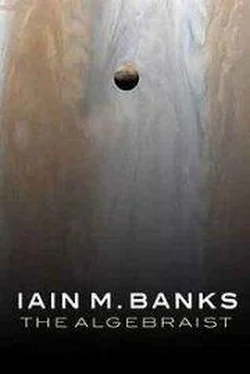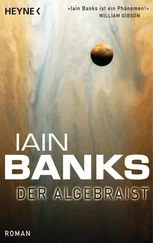Two centuries, one decade, four years and twenty days after the portal attack, exactly when it might have been expected, the first signal arrived from Zenerre, the wavefront of what would become a constant stream of information from the rest of the connected galaxy. Where, Ulubis was informed, life was going on as usual. The attack on its portal had been unique, and all was basically well with the Mercatoria. Attacks and incursions by the various Beyonder groups continued throughout the civilised galaxy, as did operations against them, but these were on the usual mainly nuisance-value level that the Beyonder Wars had evidenced for thousands of years, the tactically distressing and annoyingly wasteful but strategically irrelevant distributed background micro-violence that people had started calling the Hum.
Relief, puzzlement and a vague sense of victimisation spread throughout Ulubis system.
The Engineership Est-taun Zhiffir, portal-carrying, set out from Zenerre for Ulubis less than a year after the disaster, with a travel time initially given as 307 years, later reduced by increments to level out at 269 as the Eship upped its velocity even closer to light speed, the Engineers aboard fine-tuning the systems which insulated the hauled portal from the effects of its own and the ship’s relativistic mass. People in Ulubis system relaxed, the last vestiges of martial law were hidden away from public sight again. Those many born after the portal’s destruction wondered what it would be like to have a connection to the rest of the galaxy, to this semi-mythical meta-civilisation they’d heard so much about.
The flip-over point came, and Fassin was vaguely aware of it as the pressure on his chest and flesh and limbs faded away over the course of a few seconds, replacing that feeling of oppression with a sensation of sudden blood-roaring bloatedness as his body struggled to cope with the change. He kept his eyes closed. Almost immediately there was a faint trace of force, a gentle push from somewhere beneath his head, then weightlessness again, and a few moments later a matching tug from somewhere beneath his feet, and then weight returning, pressure quickly building, until the roaring in his head faded and became the distant thunder of the ship again.
The Archimandrite Luseferous, standing before the ruins of the city, stooped and dug gloved fingers into the soft earth by his feet, wrenching out a handful of soil. He held it to his face for a while, staring at it, then brought it close to his nose and smelled it, then let it fall and dusted off his gloves while staring down at the huge crater where a large part of the city had been.
The crater was still filling from the sea, a slow curling curve of brown-white water spilling from the estuary beyond. The waterfall disappeared into the seat of the crater in a vast cloud-bank of vapour, and steam rose everywhere from the rolling, tumbling confusion of waters as the great rocky bowl cooled. A massive trunk of steam, three kilometres or more across, rose into the calm pastel sky, rolling up through thin layers of cloud, flat-heading where it achieved the middle reaches of the atmosphere.
It was the Archimandrite’s conceit, where a severe lesson had to be taught on a planet capable of supporting such a mark, that a city by the sea, which was either itself guilty of resisting or judged by him symbolic of resistance shown by others on the planet, be remade in the image of his beloved Junch City, back on Leseum9 IV. If a people would resist him, either while undergoing conquest or enduring occupation, they would suffer, of course, but they would be part of something greater at the same time and they would, even in death, even in the death of much of their city, be the unwitting and unwilling participants in what was, indeed, a work of art. For here, seen from this hillside, was there not a new Faraby Bay? Was that slot through which the waters thundered, shaking the ground, not another Force Gap? Was that piling tower of steam, first drawn straight up then stroked to the horizon, not a kind of signature, his very own flourish?
The Bay was overly circular, certainly, and the slot a mere break in a modest crater wall composed largely of estuarine mud, presenting no aesthetic match at all for the great kilometre-high cliffs of the real Force Gap — indeed, the whole setting for this new image of junch City entirely lacked the original’s dramatic ring of surrounding mountains, and this little parkland hill on which he stood — with his admirals, generals and guard waiting obediently behind, allowing him this moment of reflection — was frankly a poor substitute for the vertical cliff of the Sheer Citadel and its magnificent views.
Nevertheless, an artist had to work with what there was to hand, and where there had once been just another swarming seaside city, lying tipped upon the land, variously hilled, messily distributed round a tributary river, with the all usual urban sprawl, great buildings, docks, breakwaters and anchorages — in other words what it had always been, roughly, no matter that there had been earlier so-called catastrophes like earthquakes or floods or great fires or bombardment from sea or air or earlier invasion — now there was an image of a fair and distant place, now there was a new kind of savage beauty, now there was a fit setting for a new city reborn in the image of his sovereignty, now there was a sort of — even — healing joining with those other peoples and places who had surrendered to his will, in suffering and in image, for this majestic crater, this latest work, was just the most recent of his creations, one more jewel on a string stretching back to the primacy of elegance that was Junch City.
Anyone with sufficient self-belief, enough ruthlessness and (Luseferous believed himself modest enough to admit) an adequate supply of luck could — if the will was there and the times required such determination — conquer and destroy. Judging how much to destroy for the effect one wished to achieve, knowing when to be ruthless, when to show leniency, even when to exhibit beguiling, rage-sapping generosity and a touch of humour; that required a more measured, a more subtle, a more — he could think of no other word for it — civilised touch. He had that touch. The record spoke for itself. To then go on from there and use the sad necessity of destruction to create art, to form an image of a better place and forge symbolic unity… that was on another level again, that elevated the mere war-maker, the mere politician, to the status of creator.
Tendrils of smoke rose all around the central column of steam, dark paltry vines adorning a huge pale trunk. These marked where defending aircraft had fallen and where fires had been started by the crater-weapon’s ground shock, no doubt. Part of the artistry involved in such a work was creating a great declivity without utterly destroying all around it (a new, reborn city had to grow here, after all). Some sophistication of weaponry was required to achieve such precision. His armaments experts attended to such details.
The Archimandrite Luseferous looked about him, smiling to his chiefs of staff, all standing respectfully at his heel, looking a little nervous to be here in the fresh air of another newly subject planet. (Yet was it not good to breathe in that fresh air, for all its alien scents? Did those strange new odours not themselves mean that another treasure had been added to their ever-increasing domain?) Above and behind, bristling war craft hovered and hummed, attended by small clouds of sensory and weapon platforms. Spread in a ring all around were his personal guards, most lying or kneeling on the grass, their darkly glinting weaponry poised. A few in military exoskels lumbered around or squatted, splayed feet squashing into the earth.
Читать дальше












